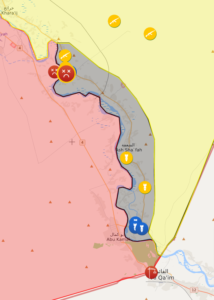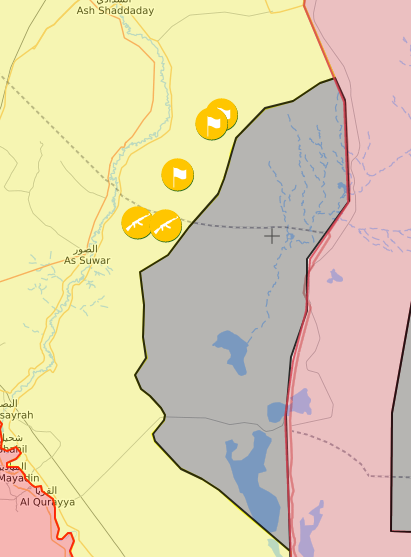Violence escalated in Nicaragua as a nationwide strike demanding that corrupt, brutal communist scumbag Daniel Ortega resign triggered a violent crackdown by pro-Sandinista paramilitary groups.
The clashes between forces that support President Daniel Ortega and demonstrators calling for his resignation mark the deadliest protests in Nicaragua since its civil war ended in 1990.
At the Divine Mercy Catholic Church in Managua, at least three people were injured, according to a post on Twitter by Paulo Abrao, an official with the Inter-American Commission on Human Rights.
One of the injured has been shot through the leg, a Washington Post reporter at the church posted on Twitter, and along with others was allowed out by police and met by waiting ambulances.
It was unclear how many people remained trapped in the church where earlier in the evening gun shots prevented those inside from leaving.
At the National Autonomous University of Nicaragua, also in the capital, some students barricaded themselves on the campus earlier in the day as paramilitary groups that support Ortega shot at the building from outside, according to media reports.
It was not clear how many people had been injured at the university.
Nicaragua has been convulsed by unrest since April when its leftist president proposed reducing pension benefits to cover a social security shortfall. The plan, later dropped, provoked deadly demonstrations and led to demands for Ortega’s resignation and early elections.
A nation-wide strike emptied streets on Friday as businesses shut their doors, heeding the call of civil society groups that have demanded Ortega’s resignation after more than three months of bloody civil unrest.
The general strike followed mass protests that fanned out across the Central American nation on Thursday.
Nicaragua has been trending this way for a while. The Trump Administration has called for Ortega and his family to step down:
U.S. Ambassador Michael Kozak, of the State Department’s bureau of democracy, human rights and labor, told a House Foreign Affairs subcommittee on Thursday that demonstrators have even been blocked from getting treatment for their injuries and government-run hospitals have reportedly required families to sign certificates that falsified the cause of deaths as a condition of retrieving relatives’ bodies.
Kozak and other administration officials told Congress that the only way to address the ongoing crisis in Nicaragua is with new elections that would allow the Nicaraguan people to pick new leadership.
“Nobody is going to be able to reconcile with the regime in power,” Kozak testified. “It’s really important for them to get out of the way and let the country make a future for itself. It’s how do you make that happen mechanically. How do you put enough pressure on the family basically to make that choice and get out of the way.”
More than 250 people have been killed since daily peaceful protests in April turned into a political uprising. Most deaths have been at the hands of the national police, state security forces and government-led gangs who target peaceful demonstrators, officials said.
While some have expressed surprise at the violence in what was once known as the most stable country in Central America, Rep. Paul Cook, R-Calif., chairman of the subcommittee on the Western Hemisphere, said this crisis did not occur overnight.
“In my view, it is a result of more than a decade of Ortega’s authoritarian rule and built-up resentment from the Nicaraguan people who have seen the Ortega family enrich themselves at the expense of the country,” Cook said, calling on the United States to take stronger actions.
Even the lefty Washington Post editorial board has gotten a clue-by-four on Nicaragua, comparing it to Venezuela, Latin America’s other socialist basket case:
THE DEATH TOLL in Nicaragua continues to rise. A bloody assault on protesters Sunday by police and pro-government paramilitary forces left 31 civilians, four police officers and three members of President Daniel Ortega’s black-hooded paramilitary groups dead. This was the highest one-day body count since pro-democracy demonstrations began April 18; it left the cumulative total at more than 300, according to human rights monitors. Monday, masked pro-Ortega thugs armed with clubs and handguns invaded a church where protesters had taken refuge and roughed up the Roman Catholic auxiliary bishop of Managua, Silvio José Báez. There are reliable reports of sniper fire against peaceful civilian protests.
Such bloodshed, so reminiscent of the political carnage that plagued Central America in the 1970s and 1980s, is repugnant enough on its own. What was especially ominous about this latest spasm, however, is that it came just after Mr. Ortega declared at a rally on Saturday his unequivocal rejection of the leading compromise proposal for resolving Nicaragua’s crisis: holding early national elections, rather than waiting for 2021. And on Monday the Ortega government issued a proclamation declaring its opponents “terrorists” and canceling any further political talks until such time as “the serious problem of terrorism, insecurity and violence . . . has been addressed and resolved in a verifiable manner.”
In short, the Ortega regime has now opted for all-out repression similar to that practiced against the democracy movement in Venezuela. It is true that protesters in Nicaragua have blocked key roads with heavy brick barricades, a tactic opponents of the erstwhile Somoza dictatorship, including Mr. Ortega’s Sandinista front, employed when that regime forced them into it — just as Mr. Ortega’s regime is forcing its opponents into strikes and civil disobedience today. This is taking a toll on the Nicaraguan economy. Yet the government is responsible for the vast majority of the deaths and injuries. Contrary to regime propaganda, the opposition remains overwhelmingly peaceful and unarmed; the only terrorism in Nicaragua today is the official kind.
There’s even an Austin angle here, with two cousins describing how they were kidnapped and beaten by paramilitary forces. (Warning: Autoplay video.) Though the piece doesn’t mention that it was pro-government paramilitary forces until 90 seconds in.
Things will continue to deteriorate in Nicaragua until Ortega either steps down or is removed from power.


